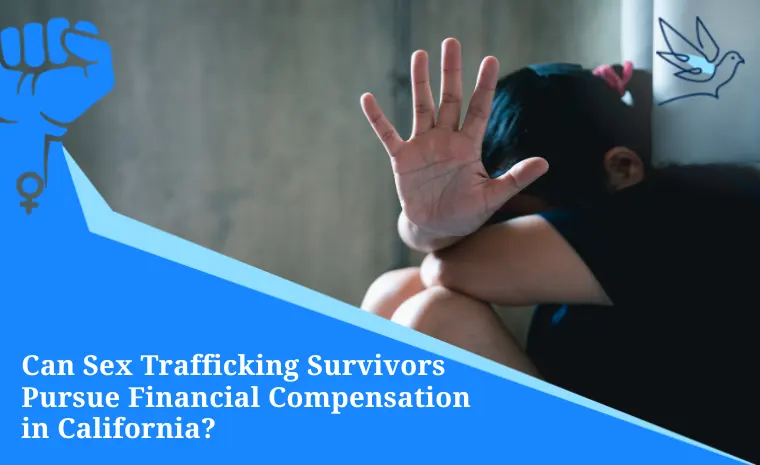Can Sex Trafficking Survivors Pursue Financial Compensation in California?
Sex trafficking is a reprehensible offense that inflicts profound harm on numerous individuals, resulting in survivors bearing enduring physical, emotional, and psychological wounds. Within the state of California, there exist legal pathways through which victims of sex trafficking can pursue financial compensation, especially when commercial entities facilitate or turn a blind eye to trafficking operations.
This blog will give you an overview of what sex trafficking is, discuss California’s laws that ensure accountability for involved establishments, highlight notable California cases where survivors received compensation, and explore the support available for victims in challenging times.
Are you a human trafficking survivor?
Sex Trafficking: A Danger to the California Community
Sex trafficking, a subset of human trafficking, is a grave issue that plagues various US states, including California. It involves the exploitation of individuals from different ages, race, and sexual orientation, often through force, fraud, or coercion, for commercial sexual purposes. This abhorrent crime not only strips victims of their freedom and dignity but also poses a significant threat to the safety and mental health of our California community.
The interconnected nature of sex trafficking and human trafficking underscores the need for heightened awareness and concerted efforts to combat this menace. By addressing these issues, we can strive to create a safer and more secure environment for all Californians.
Legal Avenues for Survivors in California
California has robust human trafficking laws that recognize the rights of survivors and provide avenues for compensation. Two of the laws that highlights securing compensation for this heinous crime are:
California Trafficking Victims Protection Act
The California Assembly Bill 22, known as the Trafficking Victims Protection Act, allows survivors to seek civil remedies against their traffickers and any individuals or entities that have knowingly benefited from the trafficking.
This bill aims to create new crimes punishable by law that are related to forcing people into labor trafficking or certain felonies, including doing the same to minors. If someone is found guilty, they could face 3 to 5 years in state prison, or 4 to 8 years for minors.
Additionally, the law would allow victims to sue for real damages, receive compensation, and protect their privacy when talking to a caseworker. This is all designed to provide better support and justice for victims.
Californians Against Sexual Exploitation (CASE) Act
The California Proposition 35 or CASE Act allows survivors of sex trafficking to bring civil lawsuits against those who have profited from their exploitation. This is applicable for businesses or commercial establishments, like hotels sued by survivors of sex trafficking.
Passed in 2012, this act aims to punish those involved in human trafficking and ensure that trafficked individuals are treated as victims rather than criminals. Additionally, there is a focus on strengthening laws related to sexual exploitation, including the requirement for sex offender registration. The aim is to enable law enforcement to better monitor and prevent online sex crimes and human trafficking.

Can Sex Trafficking Survivors Pursue Financial Compensation in California?
Yes. Survivors have the right to file claims as part of the legal case against their traffickers. When successful, they can get financial compensation that can help them recover from the injuries, trauma, and suffering following the exploitation. This compensation covers various expenses and damages, including:
- Medical Expenses: Victims of sex trafficking often suffer physical injuries and health issues. Compensation covers medical treatments, hospitalization costs, surgeries, medications, and ongoing care required for their physical recovery.
- Therapy and Counseling: The emotional and psychological toll of sex trafficking can be enduring. Compensation can be used to cover the expenses of therapy, counseling, and mental health support to help victims cope with trauma and its psychological effects.
- Lost Wages and Employment Opportunities: Many victims are forced into prostitution or other labor, denying them education and job opportunities. Compensation addresses these losses by providing financial support for lost wages and potential career prospects.
- Education and Vocational Training: Trafficking may disrupt or deny victims’ education. Compensation can fund educational programs, vocational training, and skill-building initiatives to empower sex trafficking survivors to rebuild their lives and pursue new paths.
- Housing and Relocation: Some victims require assistance in finding safe and stable housing, particularly if they need to escape their traffickers. Compensation helps cover housing costs, moving expenses, and establishing secure living environments.
Compensation for sex trafficking survivors goes beyond just a financial settlement; it acknowledges the harm and suffering they’ve endured. California’s commitment to providing compensation recognizes the rights of victims and aims to restore their dignity and well-being.
High-Profile Sex Trafficking Cases
The following high-profile sex trafficking cases in the US, including those in California, highlight the various facets of sex trafficking. From online platforms to cults and illicit establishments, these cases underscore the importance of legal action in seeking justice for survivors.
San Diego Child Sex Trafficking Case
A San Diego man has been sentenced to 100 months in federal prison for his involvement in the recruitment, advertising, and solicitation of a teenage girl for commercial sex acts. He pleaded guilty in February 2021 child sex trafficking case, acknowledging that he transported underage girls and women for prostitution across California and Colorado between November 2017 and April 2020.
The Massage Parlor Raids
California law enforcement agencies have conducted numerous raids on massage parlors suspected of being fronts for sex trafficking. Series of operations are reported across the state, including San Mateo, Fresno, and San Gabriel Valley. Survivors identified during these operations may have opportunities to seek compensation from the establishments involved.
The NXIVM Case
Although not exclusively a sex trafficking case, the NXIVM cult case in California involved sexual exploitation and manipulation of members. Some survivors pursued legal action against the cult’s leaders, resulting in convictions and potential compensation claims.
The Backpage.com Case
The Backpage.com case involves classified ads website that was seized, and its founders arrested on charges related to facilitating sex trafficking in 2018. While the case did not directly involve survivors seeking compensation, it sent a strong message that online platforms could be held accountable for enabling sex trafficking.
Are you a human trafficking survivor?
Anti-Trafficking Efforts in California
California has implemented efforts to combat various forms of trafficking and protect its residents. Some key initiatives include:
- Law Enforcement Task Forces: The state has formed specialized law enforcement task forces dedicated to investigating and prosecuting sex trafficking cases, such as the Los Angeles Regional Human Trafficking Task Force and the Alameda County Special Victims Unit.
- Victim Services: California provides comprehensive support services for trafficking survivors, including housing, medical care, counseling, and legal assistance, through organizations like the Coalition to Abolish Slavery and Trafficking (CAST) and Polaris Project.
- National Human Trafficking Hotline: California actively promotes the National Human Trafficking Hotline 1-888-373-7888 which provides a lifeline for human trafficking victims to seek help and report trafficking incidents.
- Public Awareness Campaigns: The state conducts public awareness campaigns to educate residents about the signs of sex trafficking and how to report suspicious activity. These campaigns aim to engage communities in the fight against trafficking.
- Training and Education: Various anti-trafficking organizations and agencies provide training to law enforcement, healthcare professionals, educators, and others to recognize and respond to sex trafficking effectively.
- Collaboration: Government agencies, social service providers, NGOs, and community organizations collaborate to create a coordinated response to sex trafficking, sharing information and resources to address the issue comprehensively.
These anti-sex trafficking efforts in California reflect a commitment to combating this crime, supporting survivors, and raising awareness about the issue to prevent harm to potential victims.
What Can I Do as a Sex-Trafficking Survivor?
As survivors of the traumatizing experience of sex trafficking begin their journey toward recovery and reclaiming their lives, a series of vital steps become apparent. These measures, crafted to offer assistance, access to resources, and avenues for seeking financial compensation for the injuries and suffering.
- Seek Assistance: Reach out to organizations or law enforcement agencies that specialize in supporting survivors and advocating for their legal rights. This may include local anti-trafficking movements and legal aid clinics.
- Access Available Resources: Make use of resources such as trauma-informed therapy, support groups, and vocational training programs to help rebuild your life.
- Explore Legal Possibilities: Consult with an attorney experienced in exploring the anti-trafficking field to explore legal options to get financial compensation and seek justice.
- Collaborate with Law Enforcement: Cooperate with law enforcement agencies to hold traffickers accountable and contribute to dismantling this crime network.
Get the Compensation You Deserve
Sex trafficking survivors in California have legal avenues to pursue financial compensation, especially when commercial establishments are involved. California’s robust human trafficking laws provide survivors with the means to hold those who have enabled or profited from their exploitation accountable.
High-profile cases like the Backpage.com and NXIVM cases serve as reminders that legal action can be taken against those who facilitate or overlook sex trafficking activities. Survivors have the right to seek justice and compensation for the immense harm they have endured.
Survivors of sex trafficking may seek legal representation, and attorneys specializing in human trafficking cases can provide support and ensure survivors have the best chance at claiming their rights and obtaining justice. Ultimately, the pursuit of financial compensation not only aids survivors in their healing journey but also sends a powerful message that sex trafficking will not be tolerated in California.
Women’s Right Group can help you to connect with an experienced legal team and health care providers in California. We offer assistance as you fight for justice and recover compensatory damages for the trauma and suffering you experienced.
If you or someone you know is a survivor of sex trafficking in California, we can help you. You are not alone.
Don’t hesitate to reach out to us for a free and confidential consultation at (844) 240-4967. Our support is available 24/7.






